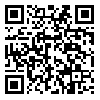BibTeX | RIS | EndNote | Medlars | ProCite | Reference Manager | RefWorks
Send citation to:
URL: http://ijpcp.iums.ac.ir/article-1-1610-en.html

 , Javad Alaghband-rad2
, Javad Alaghband-rad2 
 , Javad Mahmoudi Gharaie2
, Javad Mahmoudi Gharaie2 
 , Arshia Seddigh2
, Arshia Seddigh2 
 , Niloofar Salesian2
, Niloofar Salesian2 
 , Mohsen Jalali Roodsari2
, Mohsen Jalali Roodsari2 
 , Payam Sobhe Bidari2
, Payam Sobhe Bidari2 

2- Roozbeh Hospital, Tehran University of Medical Sciences, Tehran, Iran.
Objectives: This study aimed to compare the efficacy of an integrated treatment (IT) versus treatment as usual (TAU) in a group of inpatient children and adolescents with first episode psychosis (FEP) during a two year follow-up. Method: In a randomized controlled trial, 40 children and adolescents with FEP based on DSM-IV criteria were recruited from referrals to Robe Hospital (Tehran, Iran). They were divided into a TAU group (N=20), and an IT group (N=20) who received a low dose of atypical antipsychotic medications and family psycho-education program, and were followed up by telephone contacts. All participants were evaluated at admission and discharge as well as in 6, 12, 18 and 24 month intervals using the Kiddie-Schedule for Affective Disorders and Schizophrenia-Present and Lifetime Version-Persian Version (K-SADS-PL-PV), Positive and Negative Syndrome Scale (PANSS), Young Mania Rating Scale (YMRS), Children's Depression Inventory (CDI), Hamilton Depression Rating Scale (HAM-D), Global Assessment of Functioning Scale (GAF), and Children Global Assessment Scale (CGAS). Statistical methods consisted of analysis of independent t and c2 for qualitative variables, and random effect regression model for quantitative variables. Results: The two groups showed significant improvement in all outcome measures at different time-points. The rate and duration of recurrences were lower in the IT group compared to the TAU group. All of the other outcome measures were comparable in the two groups and there was no difference between them in different follow-up periods. Conclusion: Integrated treatment may decrease the rate and duration of recurrences in children and adolescents with FEP.
Received: 2012/10/31 | Published: 2012/08/15
| Rights and permissions | |
 |
This work is licensed under a Creative Commons Attribution-NonCommercial 4.0 International License. |

